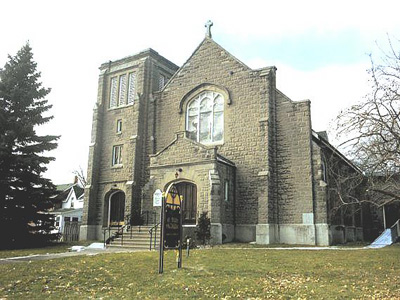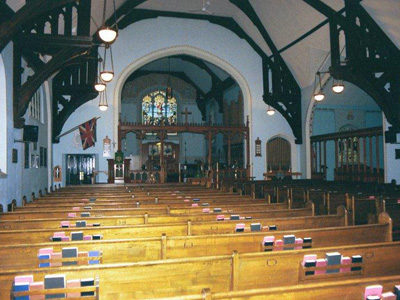 |
||||||||||
 |
||||||||||
|
1344: St Mary Magdalene, Picton, Ontario, Canada Mystery Worshipper: Henry Troup. The church: St Mary Magdalene, Picton, Ontario, Canada. Denomination: Anglican Church of Canada. The building: From outside, a rather squat rectangular gothic-like building with a separate bell tower. The inside is light and airy, with many windows, a rood screen, and an unexpected side chapel. The walls are light coloured, with big symbols painted on them in the chancel. The ceiling, fashioned of plain white acoustic tile, is a surprising contrast. A nave altar has been introduced, but the tabernacle on the high altar is used to reserve the Blessed Sacrament. One or two rows of pews have been removed to make room for a new altar rail, fashioned from the back (complete with book racks) of one of the pews that had been removed. The choir stalls remain in the chancel, but since the altar is in front of it, the choir actually sings from behind the celebrant! The big rear window is by Tiffany. A side window depicts a rather nice Last Supper with a perspective effect. There are flags of Canada and the Anglican Church of Canada. There is an actual verge racked at the back of the nave, which I have never noticed before in a Canadian church. The church: The church sponsors several concerts each year, as well as a music festival in September. They held a jazz eucharist two weeks before my visit. They carry on the tradition of the peace candle, which began in 1986 when a group of Americans visiting Russia were given money by a Russian woman to light a candle for peace back at their home church. From that simple request, peace candles have been passed from church to church and have crossed the Atlantic three times. St Mary Magdalene's peace candle was received from a church in Manitoba. The neighbourhood: St Mary Magdalene's is on Main Street in Picton, a town of 4000 people in Ontario's Prince Edward County. It's right beside the Merrill Inn and a big Royal Canadian Legion hall. It blends in well with a section of large and imposing stately buildings in a picturesque small town that was perhaps once a rather larger place. The cast: The celebrant was the Rev. William Kidnew, and the Rev. Ian Robb preached the sermon. Music was provided by Mr Michael Godwin and Ms Sheila Gribble plus a small choir (not robed). The date & time: Sunday, 3 September 2006, 10.30am. What was the name of the service? Holy Eucharist. How full was the building? Quite sparsely populated, perhaps 50 people in a space with seating for 500. Did anyone welcome you personally? Yes. An organised greeter team of three (named in the bulletin) shook hands and gave us each a book with all the service sheets inserted, as well as a green ribbon for the Ontario Organ and Tissue Donation network. We were recognised as newcomers, and the usual polite enquiries and warm conversation followed: Were we just visiting, where was our regular church, etc. We had time for some discussion of architecture and windows, too. The greeter I spoke with the most had a noticeable Irish accent. Was your pew comfortable? A hard oak pew. The pews were generously spaced and the wood finish was neither sticky nor slippery. The folding kneeler seemed a little flimsy, but we didn't really use it, as my wife's knee was giving her trouble which ruled out kneeling. When I went up for communion, though, the kneeler at the communion rail bent and creaked alarmingly. How would you describe the pre-service atmosphere? A polite buzz of people greeting each other and making ready. What were the exact opening words of the service? "Please be seated for a moment for some announcements." What books did the congregation use during the service? The Book of Alternative Services of the Anglican Church of Canada and the Common Praise hymn book, in a music edition. What musical instruments were played? Pipe organ and, I think, an electric piano to accompany the vocal solo. The church has a very fine 1914 Cassavant organ which was rebuilt in 1974 and is often used for concerts. Did anything distract you? The great deal of very fine stained glass distracted me, as I tried to make out dedications and text from too great a distance. Also, the contrast between the unornamented ceiling tiles, some of which looked as if they may have been leaking, and the gothic detail of the rest of the church continually caught my attention. There were lots of pieces of paper – green, white, yellow, blue, and pink – to look at and fumble with. The audio system had a slight, very faint, very high whine like a mosquito early on, although someone corrected that. Traffic noises came in through the open windows. Was the worship stiff-upper-lip, happy clappy, or what? Well done, by-the-book, Anglican alternative service in modern language, with sensitively chosen hymns to match the readings and the homily. When Fr Bill consecrated, he didn't elevate the elements. The congregation sang well and loudly. The choir were not there to be stars but to lead the congregation. The psalm was sung responsively, with the refrain notated in the service sheet. Neither the prayer of humble access nor the Lord's Prayer were sung, and there was no incense. After communion there was a vocal solo of an Agnus Dei by Bizet. In short, Anglo-Catholic it was not, but rather solidly mainline Canadian Anglican.  Exactly how long was the sermon? 21 minutes. On a scale of 1-10, how good was the preacher? 9 – The Rev. Ian Robb, a semi-retired United Church pastor, gave the homily. He also read the gospel in a very clear, loud voice with a light Irish accent. His tone was easy, conversational, and not at all emotional. In a nutshell, what was the sermon about? Fr Robb started with some comments linking to the day's readings and went on to his very moving testimony. In November 2000, he entered hospital for a minor day-patient procedure. Six months later, he left hospital with portable oxygen, having had his lungs destroyed by acute respiratory distress syndrome. By 2002 he was terminally ill, but in 2003 received new lungs. He referred to his unknown donor as "Bob" and spoke of the eight people who received Bob's organs. When he read a card sent by the donor family, it made me cry. The sermon was intensely personal and deeply moving testimony, delivered matter-of-factly, and with a final call to sign an organ donor card. Which part of the service was like being in heaven? The music and the sermon. The sermon is one of the handful ever to move me to tears. The Bizet Agnus Dei was an unexpected treat, and the beauty and airiness of the church was a joy. And which part was like being in... er... the other place? It was too cold in the church! The overhead fans were running and windows were open, despite it being a cool and rainy day. I was wishing I'd dressed warmer. Also, from the previous day, I had some digestive upset, and was holding in massive amounts of gas, in fear of embarrassing myself. What happened when you hung around after the service looking lost? First, Fr Bill invited everyone to coffee, located at the back of the church. Then, the coordinator of the peace candles spotted us as visitors, and came to explain the candles and offer us one to take to our church. Lots of people talked to us when we got to the coffee, including the celebrant. How would you describe the after-service coffee? Very good coffee and tea, served from thermal carafes into foam cups. I don't know if it was fairly traded. Both milk and cream were available. There was also lemonade. Homemade ginger drop cookies and apple brown sugar squares were excellent. Coffee hour is held only monthly, on the first Sunday, so we were in luck. How would you feel about making this church your regular (where 10 = ecstatic, 0 = terminal)? 9 – It's just a little "higher" than our current parish, but clearly there are many lively ministries taking place. Did the service make you feel glad to be a Christian? Absolutely. What one thing will you remember about all this in seven days' time? Fr Robb's testimony and all those Irish accents. |
|
|
||||||||||||||||||||||||||||||||||||
| More Mystery Worshipper reports | |||||||||||||||||||||||||||||||||||||||
 |
|||||||||||||||||||||||||||||||||||||||






